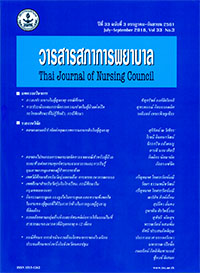Conformity to Subjective Norm and Attitudes towards Breastfeeding in Public, as Observed in Mothers with Children Aged 6-12 Months
Keywords:
breastfeeding in public, attitudes, conformity to subjective norms, breastfeeding mothers with children aged 6-12 monthsAbstract
Objective: This study compared mothers who did breastfeeding in public with
those who did not in terms of their conformity to subjective norms and attitudes towards
breastfeeding in public.
Design: Descriptive comparative design.
Procedure: The sample consisted of 68 mothers who had their children, aged
between 6 and 12 months, immunised at Sukhaphap Dek Dee Clinic (Healthy Kids Clinic).
Data were collected by means of (1) a general profle form; (2) a ‘Mother’s Experience
in Breastfeeding in Public’ questionnaire; (3) an ‘Acceptance of Breastfeeding in Public’
questionnaire; and (4) an ‘Attitudes towards Breastfeeding in Public’ questionnaire’.
The data were analysed using descriptive statistics, Mann-Whitney U-test and an
Independent T-test.
Results: The study revealed no statistically signifcant difference between the two
groups of mothers in their conformity to subjective norms regarding breastfeeding in public
(.05 (Z = -1.313, p = .189)). However, the two groups displayed a statistically signifcant
difference in their attitudes towards breastfeeding in public (t = -2.325, df = 66, p < .05).
Recommendations: It is recommended that nurses provide mothers with practical
preparatory guidelines to breastfeeding in public, and give them compliments, in order
to help them develop positive attitudes towards and confdence in breastfeeding in
public.
Downloads
References
2. The Medical Record and Statistics Department, King Narai Hospital. Annual report. Lopburi: King Narai Hospital; 2015. (in Thai)
3. Department of Health, Ministry of Public Health. 5 flagship projects 2014 [internet]. 2014. [cited 2018 May 19]. Available from: https://164.115.
22.73/r9health/wp-content/uploads/2014/04/5-Flagship-Projects.pdf (in Thai)
4. Li R, Fein SB, Chen J, Grummer-Strawn LM. Why mothers stop breastfeeding: mothers’ self-reported reasons for stopping during the frst year. Pediatrics 2008; 122: 69-76.
5. Thomas J.S., Yu E.A., Tirmizi N, Owais A, Das SK, Rahman S, et al. Maternal knowledge, attitudes and
self-effcacy in relation to intention to exclusively breastfeed among pregnant women in rural Bangladesh. Matern Child Health J 2015; 19: 49-57.
6. Brown A, Raynor P, Lee M. Young mothers who choose to breast feed: the importance of being part of
a supportive breast-feeding community. Midwifery 2011; 27: 53-9.
7. Moore ER, Coty MB. Prenatal and postpartum focus groups with primiparas: breastfeeding attitudes, support, barriers, self-effcacy, and intention. J Pediatr Health Care 2006; 20(1): 35-46.
8. Meedya S, Fahy K, Kable A. Factors that positively influence breastfeeding duration to 6 months: a literature review. Women Birth 2010; 23(4): 135-45.
9. Hawley NL, Rosen RK, Strait EA, Raffucci G, Holmdahl I, Freeman JR, et al. Mothers’ attitudes and beliefs about infant feeding highlight barriers to exclusive breastfeeding in American Samoa. Women Birth 2015; 28: 80-6.
10. Boyer K. Affect, corporeality and the limits of belonging: breastfeeding in public in the contemporary UK.Health Place 2012; 18(3): 552-60.
11. Li R, Rock VJ, Grummer-Strawn L. Changes in public attitudes toward breastfeeding in the United States,1999-2003. J Am Diet Assoc 2007; 107(1): 122-7.
12. Brown A, Davies R. Fathers’ experiences of supporting breastfeeding: challenges for breastfeeding promotion and education. Matern Child Nutr 2014; 10:510-26.
13. Scott JA, Diet GD, Kwok YY, Synnott K, Bogue J, Amarri S, et al. A comparison of maternal attitudes to breastfeeding in public and the association with breastfeeding duration in four European countries: results of a cohort study. Birth 2015; 42(1): 78-85.
14. Ajzen I. Attitudes, personality, and behavior. Milton Keynes : Open University Press; 1988.
15. Phattharayuttawat S. Manual of psychological testing 5th. Bangkok: Department of Psychology, Faculty
of Medicine Siriraj Hospital; 2008. (in Thai)
16. Walingo MK, Mutuli LA. Influence of maternal beliefs, attitude, perceived behavior on breast-feeding among
post partum mothers in western Kenya. Pakistan Journal of Nutrition 2014; 13(5): 250-4.
17. MacKean G, Spragins W. The challenges of breastfeeding in a complex world [internet]. 2012. [cited 2018 May 19]. Available from: https://www.albertahealthservices.ca/ps-1029951-pregnancy-2012-breastfeeding-lit-review.pdf
18. Borenstein M, Hedges LV, Higgins JPT, Rothstein HR. Introduction to Meta-Analysis. Chichester, West Sussex, UK: Wiley; 2009.
19. Siriwannabut P. Theories of developmental psychology. 6th ed. Bangkok: Chulalongkorn University Press; 2013. (in Thai)
20. Hohl S, Thompson B, Escareño M. Cultural norms in conflict: breastfeeding among Hispanic immigrants in rural Washington State. Matern Child Health J 2016; 20(7): 1549–57.
21. Sriraman NK, Kellams A. Breastfeeding: what are the barriers? Why women struggle to achieve their goals. J Womens Health (Larchmt) 2016; 25(7): 714-22.
22. Keely A, Lawton J, Swanson V, Denison FC. Barriers to breast-feeding in obese women: a qualitative exploration. Midwifery 2015; 31(5): 532-9.
23. Forster DA, McLachlan HL. Women’s views and experiences of breast feeding: positive, negative or just good for the baby? Midwifery 2010; 26(1): 116-25.








